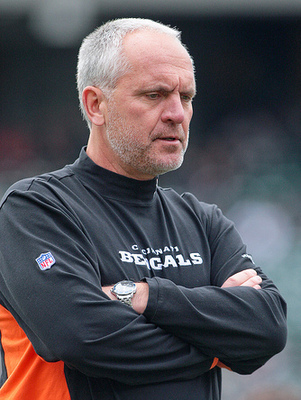
Offensive Coordinator: Bob Bratkowski
For many years throughout the last decade, the Bengals offense was considered potent but inconsistent. At different points, they had as much firepower as that of New England or Indianapolis, but were simply never able to put it together well enough for any prolonged success. Then came 2009, when someone within the Bengals organization demanded that they become a power-running team, and, lo and behold, the playoffs were reached. Finally, the team had adopted an identity that not only worked, but embodied the division that the Bengals struggled to win for so many years. They out-Pittsburghed the Steelers twice in huge games, and held the Ravens at bay with a pair of hard-nosed contests. Things fizzled out in the wild-card game, but all in all it was a damn good season for Bengals.
That offseason, everything came together in what seemed a perfect harmony of sure-fire success. First, the team parted with the severely underwhelming Laveranues Coles and the stone-handed Dan Coates, and demoted Andre Caldwell. Then, they replaced said players with Terrell Owens, Jermaine Gresham and Jordan Shipley, and the total upgrade was complete. Cedric Benson felt good and was raring for another big year, and Bernard Scott had continued to develop into an exciting young play-maker. The entire offensive line, each member of the coaching staff, and, of course, the same quarterback, all joined forces again in what many expected would be an even better campaign in 2010. They had all the right pieces in place; through personnel moves, they fixed what destroyed them in last year's playoffs. Now that they had better players in the failed positions of a year ago, they would surely become a true force in the division and beyond.
The problem was, that instead of continuing what worked so well, they decided the modern-day wheel wasn't good enough and that maybe they should reinvent a new one. And so they did.
At this point, most Bengal fans draw their swords toward Bob Bratkowski. Even if he isn't the man who makes the decision on what the offensive "identity" should look like, he still has to come under fire for the department he heads which has performed so very poorly in recent years. Putting aside the man's glaring play-calling tendencies and gross predictability, his refusal to stick with the run goes against good reasoning.
During the second half in Atlanta in Week 7, it looked like the offense really could be a vertical-pass attack using the no-huddle and had the Falcon secondary reeling. Once that looked like it could become an interesting new style for the team and maybe get the offense some meaningful productivity, Brat—or other unknown forces—went away from the no-huddle except in desperate comeback-mode. As a result of abandoning both the smash-mouth and the no-huddle attack, his team came down in a spectacular blaze of forced passes to TO and Chad Ochocinco, and a nasty string of losses ensued. Only when Carson had to throw to younger players with less television shows did the offense breathe life again, and by then it was already too late.
I don't think any play-caller can live in this world without being criticized along the way, but Mr. Bratkowski's curious methods have gone fruitless and yet unchecked for far too long now, and when the whole world points to him as a problem, there has to be some credence to such a claim.
The offense Brat intended was more of a vertical-passing model that counted on teams double-teaming Chad Ochocinco and leaving TO in one-on-one match ups. Brat likes the idea of TO going solo with anyone in the league, and that thinking isn't automatically flawed, but once it became apparent that Owens would consistently make a "business decision" on every deep ball and only give the minimum effort on passes thrown his way, the reliance on Batman should have subsided and the youngsters should have come out of the woodwork sooner. I believe Brat wanted to run Benson as many times as he did the year before, but he expected those rush attempts to come late in games and when playing with the lead. Carson Palmer was supposed to return to something like his 2005, or at least '06 form, and stretch defenses with his big arm and retooled passing attack. The aerial assault would open up the run, just like it did when Rudi Johnson was racking up thousands of yards. The day would be his again at long last.
Only it didn't work the way it was intended, and like the 2008 season, the adjustments were made too late. The season became a wash and eventually players began openly criticizing the play-calling. From the outside, it really appeared that Brat became enamored with TO in his scheme and put too much faith in his super-hero abilities. He figured the man could fly, when it turned out that he can only glide a little.
Ultimately, Brat cannot see for himself what is best for the team until the season is already lost. I am sure that he has some very logical reasons as to why he runs his offense the way he does, but after quite a thorough search for them, I can't find any good ones.
Unfortunately, he will be back. So will the same bad habits and the same overly-complicated scheme that relies on players to make great plays instead of relying on open receivers to make the routine ones. So shall the confusion between quarterback and receiver and the public lambasting by players of a system in flux. The mere fact that he remains employed with the same title is a just another classic example of the organization as a whole. I hope things improve with the new set of guys next year, but how often have we murmured that same very thing in the past?



No comments:
Post a Comment